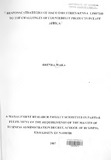| dc.description.abstract | The proposed Kenya Anti-Counterfeit Bill 2005, describes counterfeiting as " the manufacture,
producing, packaging, re-packing, labeling or making, whether in Kenya or elsewhere, of any
goods whereby those protected goods are imitated in such manner and to such a degree that those
other goods are identical or substantially similar copies of the protected goods".
The trade in counterfeits is a growing menace in the developing world due to a combination of
lax local laws and low purchasing power of the citizens. However this is not the only negative
effect that counterfeit goods pose, counterfeit goods are causing a great loss in sales by the
manufacturer of the branded product, and causing millions in lost revenue to the government as
importers of counterfeit products usually evade paying taxes.
Manufacturing firms are the ones worst affected by this influx of counterfeit products as they
lose revenue and market share to counterfeit products. This problem has escalated over the past
few years, to a situation where many manufacturing firms are choosing to shut down their
operations in Kenya because they cannot sustain their operations with the unfair competition that
is posed by counterfeit products.
The government has also realized that the issue of counterfeits is a serious threat to development
as in destroying manufacturing it is not only leading to loss of jobs for Kenyans, but to loss of
revenue for the government which it gets through various taxes that manufacturing firms pay.
The research objective was to determine the response of Haco Industries Kenya Limited, a
Kenyan manufacturing firm to the threat posed by counterfeit products. A case study was
conducted on how Haco Industries Kenya Limited has dealt with this menace in the entire East
African region in which it trades as it experiences the influx of counterfeit products which has
affected the sale of its products in these markets.
The study was conducted by administering interview guides to various levels of management of
Haco Industries Kenya Limited to find out how they rate the economic environment in which
they operate, the threat of counterfeit products to their business and how they have responded to
this threat in the countries in which they trade which include, Kenya, Uganda, Tanzania, Rwanda
and Burundi. | en |

